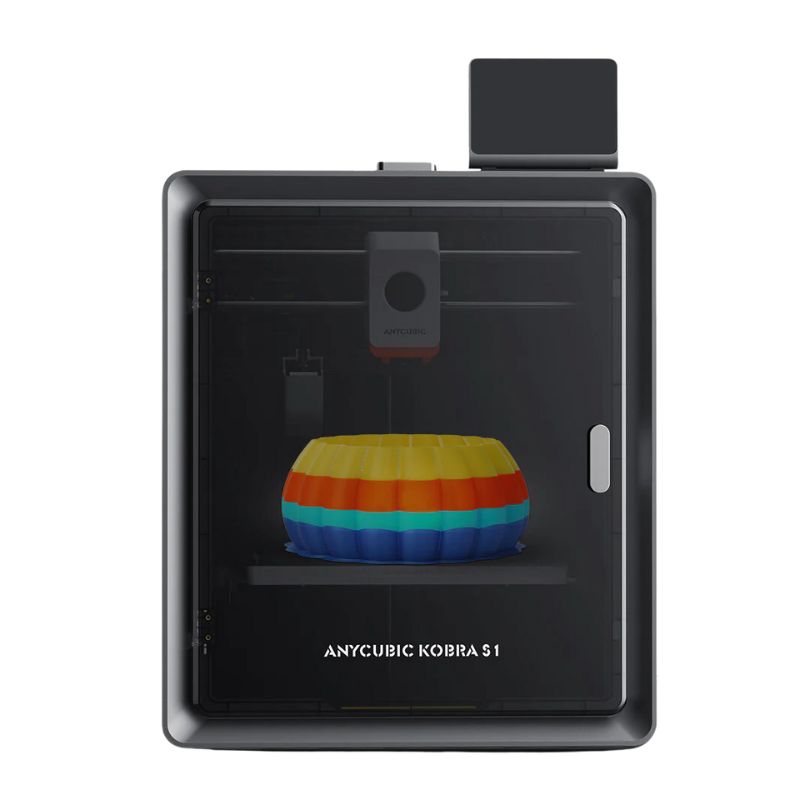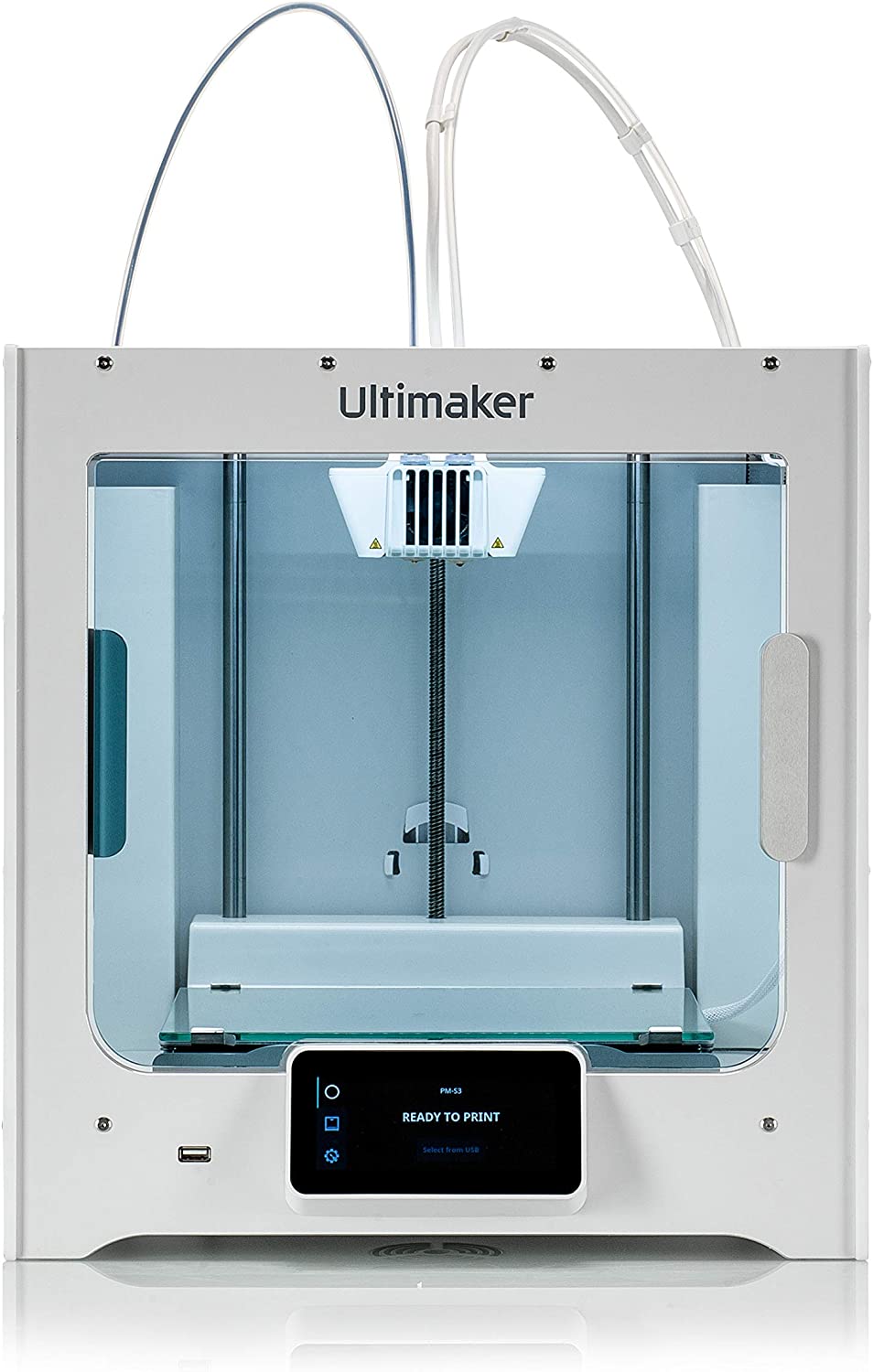Compare Kobra S1 Combo vs S5
Comparison between the best 3D printers
Choose the best 3D printer at the best price. The cheapest 3D printers are here.
Buy a 3D printer here with 3D Fila.
 |
 |
|
| Model | Kobra S1 Combo[BUY Kobra S1 Combo] |
S5 |
| Printing Material | Filament | Filament |
| Buy Filament for Anycubic Kobra S1 Combo | Buy Filament forUltimaker S5 | |
| Estimated price | $599,00 | $6950,00 |
| Manufacturer | Anycubic | Ultimaker |
| Release Year | 2025 | 2021 |
| Print Volume [mm] | 250x250x250 | 330x340x300 |
| Printer Size [mm] | 400x410x490 | 495x585x780 |
| Weight [kg] | 18 | 20,6 |
| Power Loss Recovery | YES | YES |
| Enclosed printer | YES | YES |
| Bed Leveling | Automatic | Automatic |
| Filament End Sensor | YES | YES |
| Bed type | Heated | Heated |
| Power supply system | Direct Drive | Bowden |
| Standard nozzle | 0,4 | 0,4 |
| Maximum Nozzle Temperature [°C] | 320 | 280 |
| Maximum Bed Temperature [°C] | 120 | 140 |
| Maximum printing speed [mm/s] | 600 | 80 |
| Filament holder | YES | YES |
| Camera for supervision | YES | YES |
| Recommended filaments | PLA, PETG, TPU[1], ABS, ASA | PLA, ABS, PETG, PC, Nylon, Tritan |
| Recommended slicers | Anycubic Slicer Next, Orca Slicer | Cura |
| Maximum Resolution [mm] | 0,01 | 0,1 |
| Processor | ||
| Display | Touchscreen 4,3'' | Display touchscreen 4,7'' |
| Power Supply | 110/220V / 500W | |
| Connectivity | USB, Wifi | USB / Wi-Fi |
| Operating systems | Windows, Linux e Macbook | Windows, Mac, Linux |
| Date of registration in the system | 2025-02-25 | 2022-11-08 |
| Release date | 2025 | 2021 |
| Extra features | The Anycubic Kobra S1 Combo is a fully enclosed CoreXY 3D printer with speeds up to 600mm/s and 20,000mm/s² acceleration. It features a 320°C hotend, native multicolor printing (4 to 8 colors with ACE Pro), and active filament drying. Equipped with LeviQ 3.0 auto-leveling, camera monitoring, AI failure detection, carbon filtration, and a 4.3 touchscreen, it ensures high-quality, efficient, and reliable 3D printing. | The Ultimaker S5 stands out for its easy loading and unloading of materials, automatic bed leveling and excellent print quality with resolutions from 60 to 400 microns. It has dual extruders, interchangeable print cores, advanced connectivity with Wi-Fi and LAN, and intuitive software. It includes a Wi-Fi camera for monitoring, a removable glass bed, and a large build volume, making it ideal for professional and creative environments. |
| Support for multiple colors and materials (AMS and CFS) | YES | NO |
Notes * |
||
| Cost-benefit | 7 / 10 | 2 / 10 |
| Hardware | 7.2 / 10 | 3 / 10 |
| Tela | . | . |
| Print volume | 3 / 10 | 4 / 10 |
| Performance | 5 / 10 | 1 / 10 |
| [BUY Kobra S1 Combo] |
Conclusion |
| In comparing the Anycubic Kobra S1 Combo and the Ultimaker S5, several critical factors emerge to guide your decision. The Kobra S1 Combo is significantly more affordable while offering impressive features suitable for both hobbyists and professional users. With a print speed of up to 600 mm/s and a maximum nozzle temperature of 320°C, it caters to a broad range of materials, making it versatile for various printing needs. The printer's automatic bed leveling, accompanied by advanced features like AI failure detection and multicolor printing capabilities, ensures both ease of use and high-quality output. On the other hand, the Ultimaker S5, while carrying a higher price point, is designed for professional environments where reliability and print quality are paramount. Its larger build volume and dual extruder setups facilitate complex projects, especially for users requiring high precision and advanced material compatibility. The Ultimaker excels in connectivity and user experience, featuring intuitive software and a removable glass bed. In conclusion, if cost-efficiency and functionality are your primary concerns, the Anycubic Kobra S1 Combo presents a compelling choice with extensive features and versatility. However, if you prioritize high-end performance, precision, and professional-grade quality and can justify the investment, the Ultimaker S5 is a robust option tailored for specialized applications. Your choice ultimately depends on your specific needs, budget, and intended use of the 3D printer. |

